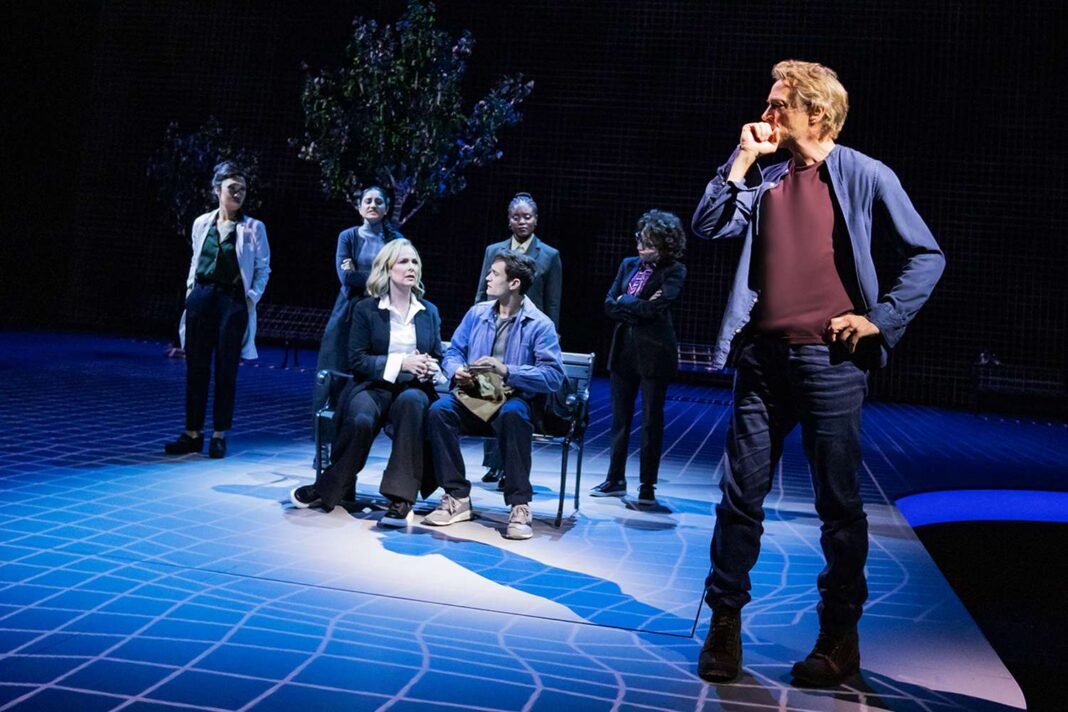:max_bytes(150000):strip_icc():format(jpeg)/robert-downey-jr-mcneal-093024-1-85338be61fdf40ed84d4560d437b97cb.jpg)
It’s a year of firsts for Robert Downey Jr. He not only took home his first Oscar for Oppenheimer in April, but the 59-year-old also announced his return to the MCU as Victor Von Doom in the upcoming Avengers films. Now, he is set to make his Broadway debut in Pulitzer-winner Ayad Akhtar’s new A.I.-infused play, McNeal.
The drama, which opened for a limited engagement at the Lincoln Center’s Vivian Beaumont Theater on Monday, tells the story of Jacob McNeal (Downey), an aging writer who discovers that he is both dying and the recipient of the Nobel Prize in Literature on the very same day. The story is told through McNeal, an outspoken A.I. anti, using the aforementioned software to help him pen his next great novel… maybe. You see, along the way, fact and fiction become so blurred that it becomes impossible to differentiate between the two.
And therein lies McNeal’s biggest problem: It is so committed to toeing the line with its unique framing that it struggles to tell the story in a fulfilling way. Akhtar, whose previous Broadway credits include the Tony-nominated Disgraced and Junk, leaves the premise so open for interpretation that it becomes disjointed, with multiple masterfully performed scenes leading to larger truths that are never brought up again and have no effect on its overall storyline. It also, crucially, doesn’t actually dig into any of the topical questions that it poses beyond a surface level examination — including its discussion about the ethics of using of A.I. within art, the job of a great artist, and, most importantly, the difference between borrowing and stealing as a writer.
Matthew Murphy and Evan Zimmerman
Speaking of Downey, he may truly be the only person who can make a character like Jacob McNeal — a master manipulator with a Texas-sized ego who at one point admits to being envious of convicted rapist Harvey Weinstein — tolerable for the entirety of the play’s one hour and 40 minute runtime. The actor, whose company (Team Downey) is also attached to the project, is a commanding presence onstage, relishing in McNeal’s smarminess and imbuing his quips with viper-like precision when anyone dares stand between him and success. He also appears to have a blast interacting with the crowd, delivering lengthy monologues more like he’s having a casual fireside chat with a friend rather than accepting a Nobel Prize.
Still, it is hard to hear Downey dish out quick-witted quips about artificial intelligence and technology and not hear echoes of his time spent as everyone’s favorite billionaire, playboy, and philanthropist, Tony Stark. However, where the MCU proved that Tony really did have a heart, Downey’s McNeal is much more self-serving and focused on his ascent to the top — even if it means trampling others, like his closest loved ones, to get there.
Downey’s performance is bolstered by his knockout costars — Ruthie Ann Miles, Saisha Talwar, Rafi Gavron, Melora Hardin, Brittany Bellizeare, and Andrea Martin — who each go to bat for and against McNeal throughout the play. Martin is a scene-stealer as Stephie, McNeal’s literary agent who runs a tight ship but is always trying to look out for her unapologetic client. Meanwhile, Gavron delivers one of the most emotional performances of the night as McNeal’s estranged son Harlan, and Bellizeare is a delight as the charming, Jesse Eisenberg-loving New York Times reporter that this world truly needs. It’s disappointing that they aren’t given much to work with — they each appear in just one or two scenes — and their characters are mere sketches in McNeal’s world.
Matthew Murphy and Evan Zimmerman
Its staging, designed by Michael Yeargan and Jake Barton, is equally impressive. A large iPhone screen sits at the heart of its sleek, white Apple-inspired stage and frequently lights up with calls and texts throughout the show. Large screens on the wings allow viewers to visually see how McNeal uses artificial intelligence to put together his next scene, sweeping through piles of documents and shutting down his spiraling requests when they get too macabre. The pièce de résistance, however, is a larger-than-life digital composite of Downey, created by Avengers directors Joe and Anthony Russo’s company AGBO, that undulates and morphs into other characters as it delivers its own onscreen monologues. It is both captivating and unnerving at the same time.
Despite its shorter runtime, director Bartlett Sher lets certain scenes — like a traumatic moment in McNeal’s gorgeously-decorated cabin between him and Harlan — linger for just a bit too long. And, without spoiling its late-game twist, the ending of McNeal is definitely controversial — viewers are going to think it’s either genius, frustrating, or just plain confusing (or, perhaps, all three at once). What I can say is that it will likely leave viewers with more questions than answers and a whole lot to talk about on the train ride home.
Matthew Murphy and Evan Zimmerman
McNeal might ask fascinating questions about a writer’s sense of integrity, the disconnect between generations of writers, and the limits of artificial intelligence within art, but the delivery is so garbled that it is difficult to ascertain what the play is actually trying to say about these complex issues… if anything at all. Grade: C+


